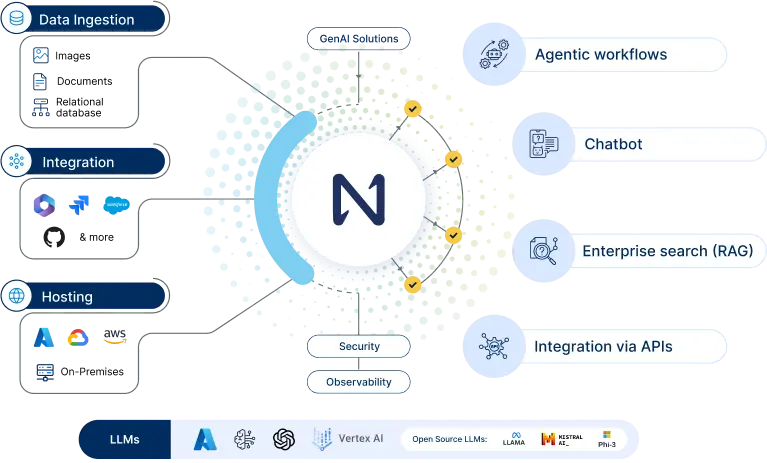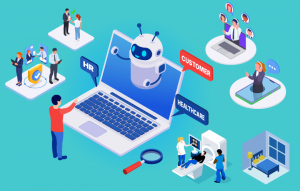It’s 2025 where the digital transformation narrative is rewritten by data and AI implementation. However, with this transformation comes a new set of challenges—ones that require more than just technical innovation.
Organizations must address high-quality data governance complexity, AI decision-making opaqueness, and have efficient AI integration into the workflow. Those businesses that emerge from this crucible of challenge will not just adapt-they will redefine what’s possible in an AI-powered future, unlock a level of agility and competitive advantage, and thereby distinguish themselves in the race of digital supremacy.
In this blog, we will explore the most critical data and AI challenges businesses will face in 2025 and the strategies required to address them. Let’s start with the most important question.
How to ensure high quality data governance?
High-quality data governance is the backbone of successful digital transformation. It has become crucial to ensure its accuracy, integrity, and accessibility. However, achieving and maintaining high-quality data governance is not without its challenges.
Challenges
Data-driven decision making has led to a scenario whereby data governance takes precedence. This is especially true for businesses that adopt AI-first approach. Therefore, enterprises will have the prime responsibility of ascertaining whether the data and AI services are accurate, accessible, and in compliance.
The Gartner Chief Data and Analytics Officer Agenda Survey for 2023 indicates that 35% of the respondents see data and analytics governance as the most important key for success.
Solutions
- Centralized data platforms: Create data lakes or data warehouses that consolidate the data, prevent fragmentation, and enforce consistency in the organization.
- Clear data ownership: Designate stewards to handle data quality, compliance, and governance issues and ensure there is accountability for those issues.
- Automated compliance tools: Employ automated solutions for adherence to GDPR and CCPA and minimize risks on compliance issues.
- Data quality standards: Establish and enforce standards for data accuracy and completeness, utilizing AI-driven tools to validate and cleanse data.
- Real-time data tracking: Integrate platforms that allow real-time tracking of data lineage, thereby providing transparency and preventing errors.
- Ongoing audits: Regular audits ensure compliance and identify areas for improvement.
Suggested: Top 10 powerful data trends for 2025 and beyond
Why is it important to address AI bias and transparency?

- Fairness and equity: AI systems may be biased.This results in unfair outcomes and errors. Eliminating bias ensures that AI is fair for all users.
- Building trust: Transparency in AI builds trust. It allows users to understand how decisions are made, which encourages adoption and reduces skepticism.
- Regulatory compliance: It addresses bias and makes sure that things are transparent so that businesses are not caught out by the increasing regulations around AI.
- Improved accuracy: Bias identification and correction improve the accuracy of AI models. This leads to more reliable and effective outcomes.
- Ethical responsibility: Fairness and transparency become an ethical obligation, especially since AI impacts many critical aspects of people’s lives.
- Accountability: Translucent AI decision-making processes help identify errors and hold developers responsible for mistakes.
How to efficiently integrate AI solutions into existing workflows?
Integrating AI into existing workflows poses several challenges. Resistance to change is common as employees may fear job displacement or struggle with new technologies. AI implementation projects also require high-quality, well-structured data, which many organizations lack.
Legacy systems may not easily integrate with AI tools. This might create compatibility issues. Moreover, there is a shortage of skilled talent for implementing and managing AI solutions.
Suggested: Why AI implementation projects fail and how you can avoid it
Solution to the challenges mentioned above
- Employee training: Create awareness through proper training programs to minimize resistance and encourage AI in productivity.
- API and middleware tools: Use integration tools to enable compatibility between AI and legacy systems.
- Invest in AI talent: Hire AI consultants or upskill professionals who can manage and optimize AI solutions.
- Phased implementation: Start with pilot projects that could be small scale, so it does not really disrupt the normal workflow.
- Cloud solutions: Scaling AI deployment would be possible because of cloud solutions as the business grows.
- Partner with an AI consulting company: Partner with expert consultants like Softweb Solutions who can effectively integrate AI in your existing workflow, providing both strategic insights and technical expertise.
How to scale generative AI solutions?
Generative AI has shown immense potential in various applications. However, scaling its use beyond proof of concepts (PoCs) remains a major challenge. Many organizations that believe in AI-first approach succeed in testing GenAI in isolated environments. However, they struggle when it comes to broader deployment. The key challenge is transitioning from experimental stages to controlled industrialization.
For generative AI to really deliver value at scale, businesses need modular GenAI platforms that can be easily adapted and integrated into existing workflows. Moreover, companies can incorporate AI agents to ensure autonomous workflows. Without a robust framework for scaling, businesses risk inconsistency, inefficiencies, or failure to fully harness the power of generative AI.
Needle: A generative AI framework powered by agentic workflow
Needle is a comprehensive GenAI framework designed by Softweb Solutions. What Needle can do?
- Answer questions and solve problems
- Automate repetitive tasks
- Generate content and reports
- And more…

What is the impact of democratizing access to data for all?
Faster decisions
Data is available to all employees at all levels of the organization. This allows quicker and more accurate decision-making that does not require centralized teams.
Foster data literacy
The role of Citizen Data Scientists is to promote non-technical employees’ ability to develop data-driven insights, thus cultivating a culture of data literacy.
A significant 81% of business leaders identify data democratization as a key initiative within their organizations. – Experian
Streamline workflow
It reduces dependence on specialized data teams, which enables more efficient workflows and quicker responses to changes in the market.
Improve collaboration
Data storytelling makes complex insights more accessible, enhancing communication and alignment across departments.
Better business competitiveness
Organizations democratizing data will be able to stay ahead of the competition since data-driven decisions are made at every level.
Why security and compliance are of utmost importance?
Organizations increasingly use data and AI to fuel business transformation. This made the issues around security and compliance even more complex. Cyber threats from data breaches to sophisticated AI-driven attacks have increased with the expansion of digital ecosystem.
Growing regulations like GDPR, CCPA, and other industry-specific laws and norms keep imposing pressures on companies to preserve their confidential information with cross-boundary compliance. Such unattended problems may face reputational risks, severe penalty through the governing body, and lose consumers’ confidence in businesses.
To effectively manage security and compliance in 2025, businesses need to adopt a multi-faceted approach that integrates advanced technologies and best practices. The following strategies are critical:
AI-driven threat detection
Monitor networks and systems in real-time with AI algorithms. This helps to quickly identify unusual activity, detect potential threats, and respond proactively. AI also helps improve predictive security, anticipating threats before they become active risks.
Suggested: Data governance and security with Microsoft Purview and Fabric
Automated compliance management
Track regulatory requirements and ensure continuous compliance with automated tools. Automation reduces the risk of human error. Moreover, it ensures that businesses are always up to date with changing regulations.
Data encryption
Strong encryption protocols protect sensitive data both in transit and at rest. This ensures that even if data is intercepted or accessed without authorization, it remains unreadable and secure.
Multi-factor authentication (MFA)
Ensure an added layer of security with multi-factor authentication across all access points. MFA helps prevent unauthorized access to sensitive systems and data.
Real-time security monitoring
Implement real-time monitoring to respond to potential security incidents as they arise. Identify vulnerabilities, detect breaches, and activate response measures promptly with continuous monitoring. This helps minimize potential damage.
Turn AI and data challenges into opportunities
As the ever-increasing number of businesses accelerate their AI-first transformation, so will these challenges. From quality data governance to AI bias mitigation, organizations should focus on seamless integration of AI into workflows as well as security.
The road forward will require the right blend of cutting-edge technology and strategic vision—embracing ethical AI, democratized access to data, and scalable solutions in GenAI. Those companies that seize on these challenges, rather than ignoring them, will not only be unlocking AI but also winning in the emerging landscape of digital advantage. The future belongs to companies that adopt AI and integrate it responsibly, efficiently, and at scale.
Partnering with AI consulting service providers like Softweb Solutions can help you navigate these challenges with expert strategies, advanced tools, and tailored AI solutions. Our AI consultants ensure efficient AI integration, regulatory compliance, and scalable implementations. Talk to our experts to accelerate digital transformation with data and AI.









